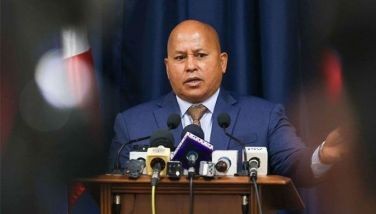Kuwait spares Filipino maid from death
Following a personal appeal from President Arroyo, Kuwaiti Emir Sabah Al-Ahmad Al-Jaber Al-Sabah spared yesterday from execution a 34-year-old Filipino domestic helper convicted of stabbing to death her female Kuwaiti employer more than two years ago.
Press Secretary Ignacio Bunye, in a statement from Kuwait, said the two leaders met for about 25 minutes at the Bayan Palace and discussed the fate of Marilou Ranario, whose penalty was commuted to life imprisonment.
The meeting took place at around 12:30 p.m. (5:30 p.m. Manila time) with officials from both sides present, and the result proved favorable to the Filipina who had languished in jail for more than two years now.
The Emir explained that Kuwait’s judicial system is separate from the executive branch.
“Normally, I don’t interfere in the judicial process. But since you are here to personally appeal for her. I will not sign the decree of execution,” Bunye said Sheikh Sabah told President Arroyo.
“That is within my power. I will reduce the penalty to life and when the other parties sign the forgiveness, I will further reduce the penalty,” the Emir said, referring to the victim’s estranged husband and maternal brother who have yet to sign the tanazuls (letter of forgiveness).
Back at home, a senior Catholic prelate earlier called on the faithful to pray for the success of the government’s efforts to save Ranario.
Lipa Archbishop Ramon Arguelles also expressed sympathy for Ranario and other overseas Filipino workers who cope with suffering at the hands of foreign employers so they could send money to their families in the Philippines.
“Let us pray for Marilou, for her release and safe arrival. She is just one of our many kababayans who are forced to commit crimes because of their miserable situation abroad – most of them are either slaves or victims of their employers,” Arguelles said in an interview aired over Church – run Radyo Veritas.
“Let us discourage our workers (from going) abroad. Or if we really can’t avoid it, let us make sure that they would be treated well. We all know that they could be in danger in some places because of cultural barriers, especially on cultures where women are treated differently,” he appealed.
“There are also places where women are second-class citizens. Pity our Filipino women who want to be pure and good. So let us pray for them,” Arguelles added.
Mrs. Arroyo thanked the Emir for his compassion for Ranario, who was sentenced to death by hanging on Sept. 28, 2005 by the Kuwaiti Court of First Instance, Criminal Circuit.
Apart from Bunye, also present during the meeting from the Philippine side were Foreign Affairs Secretary Alberto Romulo, Ambassador Ricardo Endaya, Sen. Edgardo Angara, and Pampanga Rep. Aurelio Gonzales.
At the start of their meeting, Mrs. Arroyo thanked the Emir for his country’s good treatment to some 100,000 Filipino workers in Kuwait, Gerry Carual, the chief photographer of the President, told the state-owned Radyo ng Bayan.
Carual said the Emir also thanked her for the services of the Filipino workers.
After discussing Ranario’s case, the meeting tackled bilateral relations between the two countries. Sheik Sabah then invited the presidential delegation to lunch.
Mrs. Arroyo took an unscheduled six-hour visit to Kuwait from her eight-day state visit to Spain and official visit to London to intercede for Ranario.
Long road to salvation
On Feb. 17, 2007, the Court of Appeal sustained the death verdict on Ranario, convicted of killing her employer, Najat Mahmoud Faraj Mobarak, 40, with a kitchen knife.
The Kuwaiti Court of Cassation, equivalent to the Philippines’ Supreme Court, affirmed the death verdict last Nov. 27.
According to the Department of Foreign Affairs, a counsel represented Ranario in every stage of the judicial proceedings. A total of five top-caliber Kuwaiti lawyers were hired by the DFA to represent her during the trial.
Ranario declared in open court that she killed the victim and the prosecutors presented two eyewitness’ accounts to substantiate this.
Her defense contended that she was suffering from paranoia, a major mental disorder characterized by auditory hallucinations and delusions.
According to Ranario, her employer maltreated her by humiliating and insulting her in the presence of friends.
She claimed that her delusional belief that her employer had evil plans for her led to the commission of the crime.
The Kuwaiti court ordered Ranario to undergo psychological evaluation for four weeks.
However, the results of the evaluation showed that she was mentally sound.
Four of the six legal heirs of the victim, namely, the mother, two paternal brothers, and a paternal sister, have executed affidavits of forgiveness in favor of Ranario, in exchange for blood money in the amount of $320,000.00.
Ranario carries a bachelor’s degree in elementary education but decided to leave for Kuwait in December 2003 to work as a domestic worker.
A native of Surigao del Norte, Ranario has two young children with a common-law husband. – Edu Punay
- Latest
- Trending






























